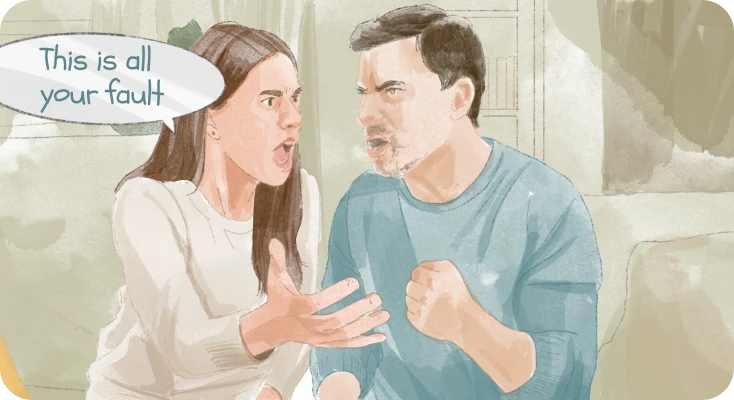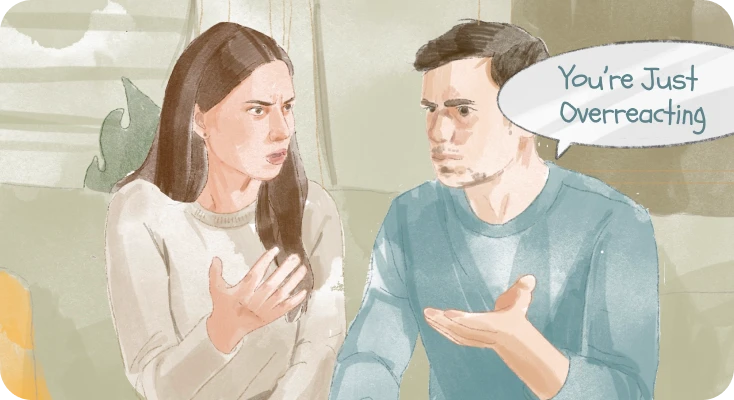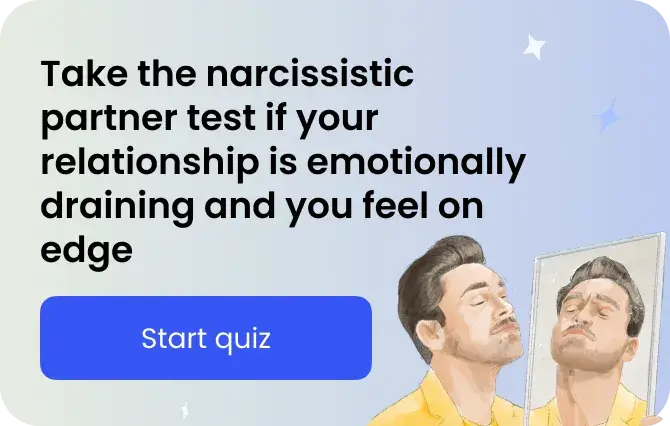Though it may sound like a term straight out of Hollywood’s heyday, gaslighting is a real example of emotional abuse. It’s not “just a joke.” In this article, we are looking at what gaslighting abuse is, examples in abusive relationships, and how to confront gaslighting behaviors in personal relationships.
What is gaslighting?
Gaslighting is a type of emotional abuse in which a person makes another person doubt their own feelings, thoughts, memories, or perception of reality. The difference between gaslighting and other emotional manipulation techniques, such as lying, is that they do not always weaken a person’s perception of reality.
According to Naomi Torres-Mackie, Ph.D., clinical psychologist, gaslighting is a “devastating” psychological technique that involves “elements of manipulation, control, and exploitation of trust”.
Gaslighting is most frequently used in relationships where there is already a power imbalance (for example, from a parent or boss) or to establish one where none previously existed, as in friendships, romantic relationships, and even within entire families. However, some psychologists say that people with certain symptoms of BPD are more likely to be gaslighted in some way. [1]
Typically, people who have personality disorders like narcissistic personality disorder (NPD) or antisocial personality disorder may act abusively or gaslight their partners to control them, specialists say. [1]
Research shows that persistent gaslighting, particularly by people you trust, can cause mental health challenges such as anxiety, long-term emotional distress, and even trauma symptoms. [2]
What is the origin of the term “gaslight”?
The word gaslighting comes from the 1938 play Gas Light, in which a husband turns down the gas lights to try to drive his wife crazy. When she points it out, he denies that the light has changed at all, which makes her question her own reality.
The terms “gaslighting,” “abuse,” and “toxic relationships” began to be actively used after 2018. The Oxford Dictionary and Merriam-Webster declared “toxicity” as the word of the year, with “gaslighting” following closely behind.
5 examples of gaslighting in romantic relationships help you spot it
An abusive partner may employ several gaslighting tactics in intimate relationships:
- Withholding
- Countering
- Blocking/Diverting
- Trivializing
- Forgetting/Denial
Clinical psychologist Courtney S. Warren has developed nine phrases and examples that can help you recognize abusive partner behavior more quickly than the names of the gaslighting tactics. Here are some of them.
1. “You’re being crazy, you’re imagining things”
Perhaps one of the most recognizable examples of gaslighting in an abusive relationship. Gaslighters are known for altering the past to fit their current emotional needs. Ever had someone insist you said something you’re dead sure you didn’t”? But I distinctly remember saying, “You start before you’re cut off with a confident, “No, you definitely said it, I’m sure.”
2. “You’re just overreacting, it’s just a joke”
In the more subtle example of gaslighting abusive behavior, the abusive partner might easily dismiss the feelings of their victim with a casual “you’re so sensitive or “you’re just imagining things.” This manipulation aims to invalidate your emotional responses or reactive abuse, no matter how rational or justified they may be.
The gaslighter wants the other person to think their own feelings and own judgments are wrong and unimportant. While each incident may appear insignificant on its own, the cumulative effect of this type of gaslighting can undermine a person’s confidence and provoke self-doubt.

3. “You made me do it”
Changing the blame so subtly that the victim is confused and sometimes even sorry is a classic trick used by gaslighters. For them, gaslighting works as a way to blame-shift their partner’s behavior. They’ll make their victim apologize for things they never did.
4. “This is all your fault”
Here, we see an example of gaslighting behaviors that try to pin the blame on their victim. They might be persuaded that they are acting badly because of your behavior. For instance, abusive partner could annoy or enrage them, but it might not be justified to blame yourself entirely.
5. “I’m only telling you this because I love you”
People who gaslight others often go after their victims’ sense of self-worth and self-esteem, making small attacks that slowly break down their confidence and provoke self-doubt behavior. The purpose of such remarks, however, is to intentionally undermine your self-confidence.
Are these examples of gaslighting familiar to you?
Other examples of gaslighting
Gaslighting can also happen outside of intimate relationships. It may also be based on racial discrimination, occur in a family, or happen in the workplace.
Workplace gaslighting
According to a 2023 source, relationships involving power dynamics, such as a supervisor’s relationship with a subordinate, can involve gaslighting. [3] For example, a boss denying past conversations, shifting blame, or rewriting events to make an employee feel bad about their work or unstable. It might sound like, “We never talked about that,” or “You are being too dramatic; that deadline was never set.”
Managers may minimize employee concerns, rewrite events to undermine their confidence, or continuously shift blame for their mistakes. Burnout may result from the worker gradually beginning to question their memory or skills.

Racial gaslighting
In research by scholars Angelique Davis and Rose Ernst in Politics, Groups, it is stated that racial gaslighting involves dismissing or invalidating experiences of racism, for instance, telling people of color they’re being “too sensitive” or imagining discrimination. [4] Both friendships and the workplace can withstand it.
Gaslighting in families
In families, gaslighting frequently manifests as a parent or family member denying emotional neglect, rewriting childhood experiences, or making someone feel unreasonable for establishing limits.
Even in cases where there are obvious patterns of emotional neglect, a parent may say, “You are imagining things; I never said that.” Children who are manipulated in this way may not know their own feelings, boundaries, or sense of who they are as adults. “You are being dramatic” or “You had a great childhood” are two things that a parent with narcissistic traits might say to a child who tries to talk to them about being hurt emotionally.
Do a quick self-evaluation to see if your upbringing has affected you.
The effects of gaslighting on your mental health
Typically, victims of gaslighting experience an upswing of emotions—confusion, fear, shame, and an overwhelming feeling of being alone in one’s reality. First-impact effects are caused by both shock and disbelief. It can shake the foundation of your most basic understanding—who you are and what reality, together, means to you.
Long-term effects of gaslighting abuse
Research highlights several key long-term effects of gaslighting [5]:
- Erosion of Self-Trust: Victims often begin to doubt their own perceptions, memories, and feelings. These things make them less confident in their decision-making and ability to understand what is going on over time.
- Chronic Doubt: Because gaslighting changes a person’s reality, they may live in a constant state of doubt, questioning themselves even when things are safe or clear.
- Hypervigilance and anxiety: Always wondering what is real or being afraid of emotional attacks can cause ongoing anxiety, hypervigilance, and the inability to relax, even in safe places.
- Depression: Feeling ignored or devalued over and over again can make you feel worthless, hopeless, and ashamed, all of which can make you depressed.
- Emotional Dysregulation: Gaslighting, as an example of emotional abuse, can damage the ability to regulate emotions. Victims may feel overwhelmed by anger, sadness, or confusion and struggle to process their feelings.
- PTSD or Complex Trauma Symptoms: Dissociation, emotional numbness, and flashbacks are some of the symptoms that survivors may experience in extreme situations, particularly when gaslighting is coupled with other types of abuse.
How to combat gaslighting tactics
In order to deal with gaslighting, you should regain your narrative and find yourself. It is about not wanting to be the main character in someone else’s twisted story. Here’s how you do it.
Expert Insight
“Here is a pro tip from Cimone Safilian, PhD, TLLP If you believe you are experiencing gaslighting, remember to trust your intuition! The tips outlined in this article are very helpful when dealing with gaslighting. It is also important to note that after consideration and re-evaluation of these behaviors on your overall well-being, it may ultimately be best to exit the relationship with the gaslighting individual. Trust your intuition, lean on others for guidance and support, and consider your options. Remember, you are never alone in this!”
Cimone Hanif
Mental health professional
Recognize the red flags of gaslighting
Once you can spot warning signs, you’re not just aware. You are equipped. Here are some red flags that you might be involved in abusive gaslighting relationships, according to the National Domestic Violence Hotline:
- You constantly second-guess yourself
- You ask yourself, “Am I too sensitive?” multiple times daily
- You often feel confused and even crazy
- You’re always apologizing to your partner
- You can’t understand why you aren’t happier with so many apparently good things in your life
- You frequently make excuses for your partner’s behavior to friends and family
- You feel isolated
Document the doubtful sayings from the abusive partner
Keep a gaslight-proof journal of events. It’s your own reality, your own memories, and it’s time to say those three powerful words that stop gaslighting in its tracks: I. Don’t. Agree.
Avoid engaging in arguments; if engaged, stay calm
Gaslighters often thrive on creating arguments and confusion. Try not to get dragged into endless debates. Instead, focus on asserting your feelings calmly. If you are already engaged in an argument, try to maintain your composure, even though it can be challenging.
Set boundaries, and keep them
Once you know what you won’t accept, draw the line. And when it’s crossed, have the courage to call it out. Setting boundaries can help you gain power that an abusive partner is trying to keep.
Seek support
Sometimes, individuals outside of abusive relationships provide the best reality checks. Talk it out with a trusted friend, family member, or mental health professional.
If you find yourself in any of these abusive behaviors, give a call to the National Domestic Violence Hotline at 1-800-799-7233, or you can chat with them online 24/7/365. They have advocates who are there to support and listen to you.
Practice self-care and self-discovery
Gaslighting can cause self-doubt, so try to stay aware of your emotions and remember your worth—the healthier your self-esteem, the less a manipulator’s words stick. Find out yourself before anyone else can tell you who you should be.
Try Breeze test to discover, reunite with, and care for your inner child; evaluate your EQ level; and know if you are in a relationship with a narcissist.
Frequently asked questions
What is gaslighting, and how do I stop it?
It's a form of psychological manipulation that makes you doubt your own perception of reality, your own thoughts, or your own feelings and sanity. To stop, set clear boundaries, write down interactions to make things more clear, and get support or validation from someone you trust, like a therapist, to get your sense of reality back.
Can gaslighting be unintentional?
Yes, gaslighting can be unintentional. Some people deflect, deny, or rewrite events out of defensiveness or learned behavior without realizing the psychological harm they’re causing. However, regardless of intent, the impact on the other person’s sense of reality and mental health remains damaging.
What are the first red flags of gaslighting in an intimate relationship?
Early red flags examples of gaslighting in an intimate relationship are: Your partner regularly denies things you clearly remember happening. They accuse you of being 'too sensitive' or 'crazy' when you express valid emotions. You often feel confused, second-guess yourself, or apologize even when you're not at fault. They lie or shift blame to avoid taking responsibility.
Sources:
- Psychology Today (2022) The Relationship Between BPD Dissociation and Gaslighting. Daniel S. Lobel Ph.D.
- Shekhar, Shakshi & Tripathi, Kaushlendra. (2024). Impact of Gaslighting on Mental Health among Young Adults. International Journal of Indian Psychology
- Kukreja, P., & Pandey, J. (2023). Workplace gaslighting: Conceptualization, development, and validation of a scale. Frontiers in psychology.
- Davis, Angelique & Ernst, Rose. (2017). Racial gaslighting. Politics, Groups, and Identities. 7. 1-14
- Sengkey, Marssel & Illahibaccus-Sona, Shaima. (2024). Psychological and behavioral impacts of early adult women victims of gaslighting behavior in romantic relationships. Indonesian Journal of Psychological Research.
Disclaimer
This article is for general informative and self-discovery purposes only. It should not replace expert guidance from professionals.
Any action you take in response to the information in this article, whether directly or indirectly, is solely your responsibility and is done at your own risk. Breeze content team and its mental health experts disclaim any liability, loss, or risk, personal, professional, or otherwise, which may result from the use and/or application of any content.
Always consult your doctor or other certified health practitioner with any medical questions or concerns
Breeze articles exclusively cite trusted sources, such as academic research institutions and medical associations, including research and studies from PubMed, ResearchGate, or similar databases. Examine our subject-matter editors and editorial process to see how we verify facts and maintain the accuracy, reliability, and trustworthiness of our material.
Was this article helpful?






